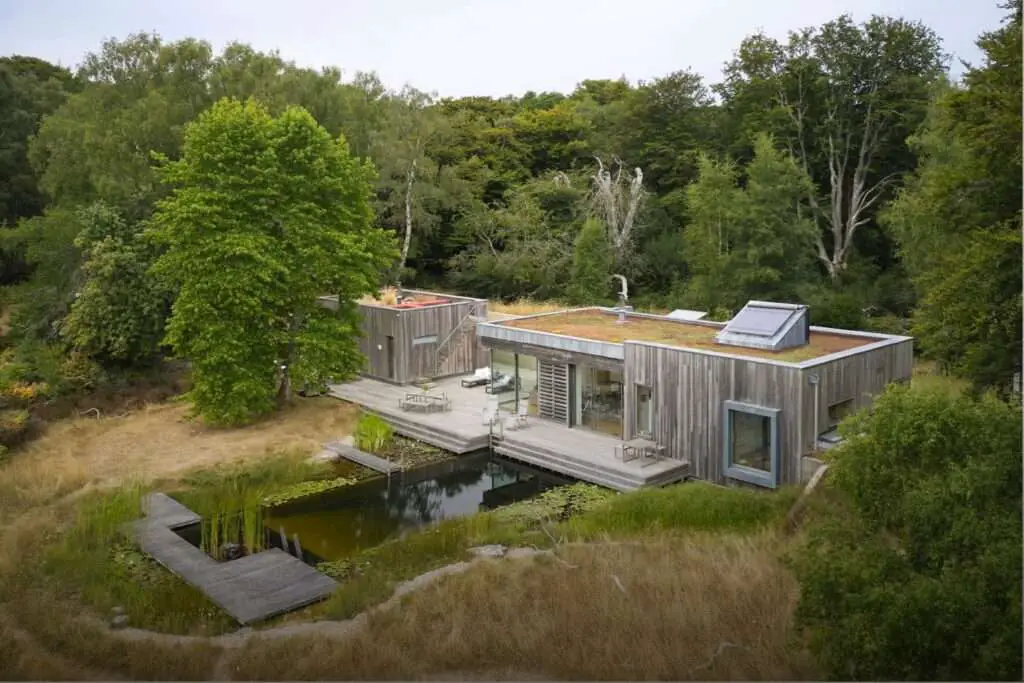Off grid living Germany is experiencing a surge in popularity, with more people seeking self-sufficiency and a closer connection to nature. This movement challenges traditional lifestyles, demanding careful planning and resourcefulness to navigate legal hurdles, secure sustainable energy, and manage essential resources like water and waste. The transition to off-grid living requires a deep understanding of German regulations, innovative solutions for energy independence, and a commitment to sustainable practices.
This burgeoning trend presents both opportunities and challenges. While offering a pathway towards environmental responsibility and a simpler life, navigating the legal complexities and ensuring self-sufficiency require significant preparation and resourcefulness. This article delves into the practicalities of off-grid living in Germany, examining the legal framework, sustainable energy solutions, resource management, and the social aspects of this increasingly popular lifestyle choice.
Legal and Regulatory Aspects of Off-Grid Living in Germany
Germany’s legal framework regarding off-grid living is complex, varying across its sixteen states (Bundesländer). While outright prohibition is rare, navigating the permitting process requires meticulous planning and adherence to building codes, land-use regulations, and environmental protection laws.
Land Ownership and Building Regulations
German land ownership is strictly regulated. Acquiring land suitable for off-grid living often involves navigating complex legal procedures and potentially high purchase prices, especially in desirable rural areas. Building regulations vary significantly between states, with some being more lenient than others towards unconventional housing designs. Permits are typically required for any construction, including off-grid dwellings, and these often involve detailed plans and environmental impact assessments.
Permitting Process for Off-Grid Dwellings
The permitting process typically involves submitting detailed plans to the local building authority (Bauamt). These plans must meet stringent building codes and demonstrate compliance with environmental regulations. The process can be lengthy, involving multiple reviews and potential revisions. Factors such as water supply, waste disposal, and energy sources are carefully scrutinized. Securing necessary permits often requires the assistance of architects and legal professionals experienced in navigating German building regulations.
Variations in Regulations Across German States
Significant differences exist in the regulations governing off-grid living between German states. Some states have more established procedures for approving off-grid projects, while others may have more restrictive interpretations of existing building codes. For example, Bavaria might have stricter regulations regarding water usage than Brandenburg. Prospective off-grid dwellers should research the specific regulations of the target state thoroughly before initiating any plans.
Examples of Successful Off-Grid Living Permits
While specific examples of permitted off-grid homes are often kept private due to privacy concerns, successful applications generally demonstrate meticulous planning, compliance with all regulations, and a strong emphasis on environmental sustainability. These applications often involve detailed energy plans, sustainable water management systems, and comprehensive waste disposal strategies. Consulting with individuals who have successfully navigated the permitting process in a specific region can prove invaluable.
Energy Solutions for Off-Grid Homes in Germany: Off Grid Living Germany
Designing a reliable and sustainable energy system is crucial for off-grid living in Germany. A combination of renewable energy sources, energy efficiency measures, and potentially battery storage is typically necessary. The specific mix depends on factors such as location, energy consumption, and budget.
Comprehensive Energy System Design
A typical off-grid energy system in Germany might incorporate solar photovoltaic (PV) panels for electricity generation, complemented by a wind turbine, especially in areas with consistent wind. Biomass boilers, utilizing sustainably sourced wood pellets or other materials, can provide heating. Battery storage is crucial for managing fluctuating energy production and ensuring a consistent supply. Careful consideration of energy consumption patterns and efficient appliance usage is essential for optimizing system design.
Costs of Different Energy Solutions
The initial investment in an off-grid energy system can be substantial, varying greatly depending on the chosen technologies and scale. Solar PV systems are relatively cost-effective per kilowatt-hour, while wind turbines require a higher initial investment but can offer greater power output. Biomass systems involve ongoing costs for fuel procurement. Long-term maintenance costs also need to be factored in, including repairs, replacements, and cleaning.
The rise of off-grid living in Germany reflects a growing interest in self-sufficiency and environmental consciousness. However, a complete disconnect from modern conveniences isn’t always feasible, leading many to explore alternative solutions. For a deeper understanding of the interconnectedness of energy systems, consider the concept of grid living , which offers a different perspective on resource management.
Ultimately, the optimal approach for sustainable living in Germany often involves a careful balance between off-grid independence and the benefits of grid connection.
Efficiency and Environmental Impact Comparison
Solar PV and wind energy are considered the most environmentally friendly options, with minimal ongoing emissions. Biomass systems have a lower carbon footprint than fossil fuels but still produce some emissions during combustion. The efficiency of each system varies depending on factors such as weather conditions, system design, and maintenance. A well-designed system that combines multiple renewable sources can maximize efficiency and minimize environmental impact.
Comparison of Off-Grid Energy Systems
| System | Pros | Cons | Suitability for Germany |
|---|---|---|---|
| Solar PV | Relatively low cost, low maintenance, readily available technology | Intermittent power generation, requires significant roof space or land | Highly suitable, especially in southern Germany |
| Wind Turbine | High power output, suitable for windy areas | High initial cost, potential noise pollution, requires sufficient space | Suitable in windy regions, but regulations may be restrictive |
| Biomass | Reliable heat source, utilizes renewable resource | Requires fuel sourcing, potential air pollution, higher maintenance | Suitable, particularly in forested areas, but requires sustainable fuel management |
Water Management in Off-Grid German Dwellings
Securing a reliable and clean water supply is paramount for off-grid living. Rainwater harvesting, coupled with efficient filtration and purification systems, is commonly employed. Well drilling may be an option, but it is subject to stringent regulations.
Rainwater Harvesting and Storage
Rainwater harvesting involves collecting rainwater from rooftops and storing it in tanks. The size of the tank depends on the household’s water consumption and the average rainfall in the region. Proper filtration is crucial to remove sediment and impurities. Regular cleaning and maintenance are essential to prevent bacterial growth.
Well Drilling Regulations
Well drilling for private water sources in Germany is subject to strict regulations, requiring permits from the local authorities. Geological surveys are often necessary to assess water availability and potential contamination risks. Regulations aim to protect groundwater resources and prevent over-extraction.
Water Filtration and Purification Systems
Various water filtration and purification systems are available for off-grid use, ranging from simple sediment filters to more sophisticated multi-stage systems incorporating UV sterilization or reverse osmosis. The choice of system depends on the water source’s quality and the household’s needs.
Designing a Sustainable Water Management System
- Assess water needs and rainfall patterns.
- Design a rainwater harvesting system, including gutters, downspouts, and storage tanks.
- Select appropriate filtration and purification methods.
- Develop a water usage plan to minimize consumption.
- Regularly monitor water quality and tank maintenance.
Waste Management and Sanitation in Off-Grid Germany
Sustainable waste management is critical for off-grid living. Composting toilets offer a viable alternative to traditional sewage systems, while greywater and wastewater require careful management to prevent environmental contamination.
Composting Toilet Systems
Various composting toilet systems are available, suitable for different climates and preferences. These systems typically involve separating solid and liquid waste, with the solid waste undergoing composting. Local regulations may influence the choice of system and its placement.
Greywater and Wastewater Management
Greywater (from showers, sinks, and laundry) can be reused for irrigation or other non-potable purposes after appropriate treatment. Blackwater (toilet waste) requires more stringent treatment before disposal or reuse. Options include constructed wetlands or bio-filtration systems.
Waste Reduction and Recycling Strategies, Off grid living germany
Minimizing waste generation is crucial for off-grid living. This involves composting food scraps, recycling materials whenever possible, and reducing consumption. Careful planning and resourcefulness are essential to minimize waste.
Resources for Sustainable Waste Management
- Composting toilets
- Greywater recycling systems
- Waste separation containers
- Recycling guides and local recycling centers
Community and Social Aspects of Off-Grid Living in Germany
Off-grid living in Germany presents both challenges and rewards. Social integration and access to services can be more challenging in remote locations, but strong community ties can offset these difficulties.
Challenges and Benefits of Remote Living

Source: offgridharmony.com
Living in a remote location may limit access to shops, healthcare, and other services. However, it offers greater privacy, a connection with nature, and a slower pace of life. Successful off-grid living often involves careful planning and a willingness to embrace a more self-sufficient lifestyle.
Importance of Community Building
Building strong relationships with neighbors and other off-grid dwellers is essential for sharing resources, exchanging knowledge, and providing mutual support. Community cooperation can help overcome the challenges of remote living and foster a sense of belonging.
Examples of Successful Off-Grid Communities

Source: centreofexcellence.com
While specific examples of established off-grid communities in Germany are not widely publicized, the success of such communities often hinges on shared values, cooperative resource management, and a commitment to environmental sustainability. These communities often create their own informal support networks and systems for sharing resources and knowledge.
Resources and Support Networks
- Local environmental groups
- Off-grid living forums and online communities
- Sustainable living workshops and courses
- Consultants specializing in off-grid design and construction
Illustrative Examples of Off-Grid Homes in Germany
While specific details of private off-grid homes in Germany are generally not publicly available for privacy reasons, we can construct hypothetical examples to illustrate the possibilities.
Example 1: The Bavarian Solar Homestead
This home, nestled in the Bavarian countryside, utilizes a large solar PV array to generate electricity. A rainwater harvesting system provides water, and a composting toilet handles waste. The home is built with locally sourced, sustainable materials, minimizing its environmental impact. The inhabitants face challenges related to winter weather and limited access to services but enjoy the peace and tranquility of rural life.
Example 2: The Brandenburg Windmill Retreat
Situated in a windy region of Brandenburg, this off-grid home relies on a wind turbine as its primary energy source, supplemented by solar PV panels. A well provides water, and a greywater recycling system minimizes water consumption. The home’s design integrates seamlessly with the surrounding landscape, minimizing its visual impact. The inhabitants experience challenges related to noise pollution from the wind turbine and occasional power outages.
Example 3: The Black Forest Eco-Cabin
This eco-friendly cabin in the Black Forest utilizes a combination of solar and biomass energy for heating and electricity. Rainwater harvesting and a well provide water, while a composting toilet and a greywater recycling system handle waste. The home’s design emphasizes energy efficiency and sustainable building materials. The inhabitants face challenges related to accessing services and dealing with the challenges of a harsh winter climate, but enjoy a close connection with nature.
Closure
Embracing off-grid living in Germany requires a blend of meticulous planning, innovative solutions, and a strong commitment to sustainable practices. While the challenges are significant, ranging from navigating complex regulations to ensuring self-sufficiency in energy and resources, the rewards—a life closer to nature and a reduced environmental footprint—are equally compelling. The growing community of off-grid dwellers in Germany demonstrates that a sustainable and fulfilling life outside the traditional grid is achievable with careful consideration and proactive planning.
